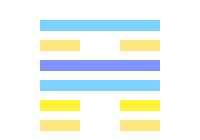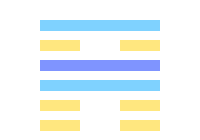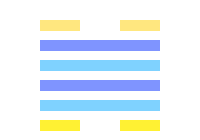56.2.4 (56 > 18)

56.2.4 (56 > 18) - THE LÜ HEXAGRAM.
- 2. The second line, divided, shows the stranger, occupying his lodging-house, carrying with him his means of livelihood, and provided with good and trusty servants.
- 4. The fourth line, undivided, shows the traveller in a resting-place, having (also) the means of livelihood and the axe, (but still saying), ‘I am not at ease I in my mind.’
56.2.4 (56 > 18) - Searching
One may venture in strange places to never return.
Bing DeepL Google Yandex56.2.4 (56 > 18) - Searching
One may venture in strange places to never return.
Bing DeepL Google Yandex56.2.4 (56 > 18) - Lu, le voyageur
Lu : voyageur, hôte, étranger, loger ; bon arrangement.
- 2. L’étranger qui s’est établi quelque part doit y déposer tous ses biens et se procurer des serviteurs jeunes et habiles ; il lui arrivera bonheur.
- 4. Il peut s’être établi quelque part, y avoir ses biens et sa hache, mais son cœur n’est point encore à l’aise et en sûreté. (Il n’a point une situation assurée, il doit veiller.)
56.2.4 (56 > 18) - Chercher
On peut s'aventurer dans des endroits étranges pour ne jamais revenir.
Bing DeepL Google Yandex56.2.4 (56 > 18) - Keresés
- 2. Találkozik valakivel aki segíteni szeretne.
- 4. Védi magát a többiektől, nem teszi jól.
The trigrams
The trigrams are combinations of three yin and yang lines. The three bottom lines of the hexagram form the lower trigram and represent the inner situation. The three top lines form the upper trigram and represent the outer situation.
Upper trigram: The fire The mountain


Lower trigram: The mountain The wind


The formation: 56
What is already there

56 - THE LÜ HEXAGRAM.
Lü intimates that (in the condition which it denotes) there may be some little attainment and progress. If the stranger or traveller be firm and correct as he ought to be, there will be good fortune.
Bing DeepL Google Yandex56 - Lu, le voyageur
Lu : voyageur, hôte, étranger, loger ; bon arrangement.
Lu « bon arrangement ». Avec un faible commencement, le bon arrangement conduit au succès, à la consolidation, au bonheur.
Texte
L’étranger ambulant prospère difficilement. S’il est juste et droit, il aura une heureuse fortune.
Symbolisme
Le feu au-dessus d’une montagne. Ainsi le grand et sage fait briller sa droiture en appliquant les lois pénales et ne laisse pas durer les différends et les procès.
Commentaire
Si le faible acquiert, maintient sa droiture chez les étrangers et reste soumis au fort, il sera stable et attaché à la claire vérité. Ainsi l’étranger nomade, faible au commencement, prospérera et s’affermira s’il est droit et juste.

56.2 (56 > 50) - THE LÜ HEXAGRAM.
The second line, divided, shows the stranger, occupying his lodging-house, carrying with him his means of livelihood, and provided with good and trusty servants.
Bing DeepL Google Yandex56.2 (56 > 50) - Believing without evidence
One meets a person who is well disposed towards one.
Bing DeepL Google Yandex56.2 (56 > 50) - Believing without evidence
One meets a person who is well disposed towards one.
Bing DeepL Google Yandex56.2 (56 > 50) - Lu, le voyageur
Lu : voyageur, hôte, étranger, loger ; bon arrangement.
L’étranger qui s’est établi quelque part doit y déposer tous ses biens et se procurer des serviteurs jeunes et habiles ; il lui arrivera bonheur.
Bing DeepL Google Yandex56.2 (56 > 50) - Croire sans preuves
On rencontre une personne bien disposée envers nous.
Bing DeepL Google Yandex
56.4 (56 > 52) - THE LÜ HEXAGRAM.
The fourth line, undivided, shows the traveller in a resting-place, having (also) the means of livelihood and the axe, (but still saying), ‘I am not at ease I in my mind.’
Bing DeepL Google Yandex56.4 (56 > 52) - Losing legitimacy
When one defends oneself from others, one sees that things are not going well.
Bing DeepL Google Yandex56.4 (56 > 52) - Losing legitimacy
When one defends oneself from others, one sees that things are not going well.
Bing DeepL Google Yandex56.4 (56 > 52) - Lu, le voyageur
Lu : voyageur, hôte, étranger, loger ; bon arrangement.
Il peut s’être établi quelque part, y avoir ses biens et sa hache, mais son cœur n’est point encore à l’aise et en sûreté. (Il n’a point une situation assurée, il doit veiller.)
Bing DeepL Google Yandex56.4 (56 > 52) - Perdre sa légitimité
En se défendant des autres, on voit que ça ne va pas.
Bing DeepL Google YandexIn the making: 18
What is poised to happen

18 - THE KÛ HEXAGRAM.
Kû indicates great progress and success (to him who deals properly with the condition represented by it). There will be advantage in (efforts like that of) crossing the great stream. (He should weigh well, however, the events of) three days before the turning point, and those (to be done) three days after it.
Bing DeepL Google Yandex18 - Disorder
One needs to abandon their affairs and make oneself available to patiently soften one's most embarrassing flaws, so that one can inspire confidence and be engaged by those who can help them.
Bing DeepL Google Yandex18 - Disorder
One needs to abandon their affairs and make oneself available to patiently soften one's most embarrassing flaws, so that one can inspire confidence and be engaged by those who can help them.
Bing DeepL Google Yandex18 - Kù, l’élimination de la chose pourrie
[color=blue]Kū : délibération, embarras, trouble, soucis.
Texte
La délibération, chose éminemment utile, fera triompher des difficultés. On doit délibérer trois jours avant d’agir ; puis trois jours après (sur les conséquences).
Symbolisme
C’est le vent sous la montagne. Le fort au-dessus, le petit au- dessous ; soumission chez l’un, droiture ferme chez l’autre ; c’est ce que représente le Koua kū. Aussi le grand doit encourager le peuple et développer les vertus.
Commentaire
Si l’on délibère sagement, le monde sera bien gouverné. Quand on va à une affaire, on doit délibérer trois jours avant et trois jours après.
18 - Le désordre
On a besoin d'abandonner ses affaires et se rendre disponible pour adoucir patiemment ses défauts les plus gênants, afin de pouvoir inspirer confiance et être engagé par ceux qui peuvent nous aider.
Bing DeepL Google Yandex18 - Rendetlenség
Fel kell hogy hagyjon az üzlettel
és hogy rendelkezésre állva türelmesen tompítsa a legtöbb kínos hibát, hogy képes legyen bizalmat sugallni és segítőtársakra leljen.
The nuclear hexagram: 28.1.3.5 (28 > 54)
The nuclear hexagram is the association of the two inner trigrams (lines 2,3,4 and 3,4,5). It represents the root, or the origin of the situation.

28.1.3.5 (28 > 54) - THE TÂ KWO HEXAGRAM.
- 1. The first line, divided, shows one placing mats of the white mâo grass under things set on the ground. There will be no error.
- 3. The third line, undivided, shows a beam that is weak. There will be evil.
- 5. The fifth line, undivided, shows a decayed willow producing flowers, or an old wife in possession of her young husband. There will be occasion neither for blame nor for praise.
28.1.3.5 (28 > 54) - Losing control
When one is frivolous one does not care about the future of one's children.
Bing DeepL Google Yandex28.1.3.5 (28 > 54) - Losing control
When one is frivolous one does not care about the future of one's children.
Bing DeepL Google Yandex28.1.3.5 (28 > 54) - Tá kvoh, le grand excès
Tá kvoh : 1. Grand excès, défaut, manquement ; 2. Traverser, dépasser.
-
1. Ceci est susceptible de deux explications : a. « S’appuyer sur des joncs » est un grand défaut ; ils plient et ne soutiennent pas. b. Pour placer un objet comme natte à offrande, se servir de mao blanc est fautif.
Note. Au lieu de gratter simplement la terre et l’aplanir.
(Le mao blanc représente la pureté, la droiture, kiet tche. Ceci d’après le commentaire représente un excès de précaution. Kwéh hu weï shin (1er sens). - 3. Une poutre, un pilier trop faible (voir texte I) sont mauvais (ils ne peuvent supporter) (grand défaut).
- 5. Un vieux saule produisant une fleur, une vieille femme épousant un homme encore jeune, quoique non blâmables, ne peuvent être loués. La fleur du vieux saule ne peut durer, l’époux d’une vieille femme peut s’en dégoûter. (Faits qui passent les règles ordinaires.)
28.1.3.5 (28 > 54) - Perdre le contrôle
Quand on est frivole on ne se soucie pas de l'avenir de ses enfants.
Bing DeepL Google Yandex28.1.3.5 (28 > 54) - Lemondás
- 1. Fejlődni akar a gyengeség miatt.
- 3. Ápolja kapcsolatait.
- 5. Igyekszik javítani mielőtt mások észrevennék a hanyatlást.
Ruler
The starting situation

56.4 (56 > 52) - THE LÜ HEXAGRAM.
The fourth line, undivided, shows the traveller in a resting-place, having (also) the means of livelihood and the axe, (but still saying), ‘I am not at ease I in my mind.’
Bing DeepL Google Yandex56.4 (56 > 52) - Losing legitimacy
When one defends oneself from others, one sees that things are not going well.
Bing DeepL Google Yandex56.4 (56 > 52) - Losing legitimacy
When one defends oneself from others, one sees that things are not going well.
Bing DeepL Google Yandex56.4 (56 > 52) - Lu, le voyageur
Lu : voyageur, hôte, étranger, loger ; bon arrangement.
Il peut s’être établi quelque part, y avoir ses biens et sa hache, mais son cœur n’est point encore à l’aise et en sûreté. (Il n’a point une situation assurée, il doit veiller.)
Bing DeepL Google Yandex56.4 (56 > 52) - Perdre sa légitimité
En se défendant des autres, on voit que ça ne va pas.
Bing DeepL Google YandexCorrection
The direction where the ruler is going to bend

56.2 (56 > 50) - THE LÜ HEXAGRAM.
The second line, divided, shows the stranger, occupying his lodging-house, carrying with him his means of livelihood, and provided with good and trusty servants.
Bing DeepL Google Yandex56.2 (56 > 50) - Believing without evidence
One meets a person who is well disposed towards one.
Bing DeepL Google Yandex56.2 (56 > 50) - Believing without evidence
One meets a person who is well disposed towards one.
Bing DeepL Google Yandex56.2 (56 > 50) - Lu, le voyageur
Lu : voyageur, hôte, étranger, loger ; bon arrangement.
L’étranger qui s’est établi quelque part doit y déposer tous ses biens et se procurer des serviteurs jeunes et habiles ; il lui arrivera bonheur.
Bing DeepL Google Yandex56.2 (56 > 50) - Croire sans preuves
On rencontre une personne bien disposée envers nous.
Bing DeepL Google Yandex
